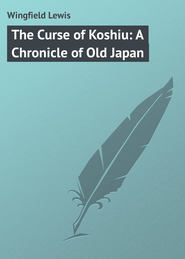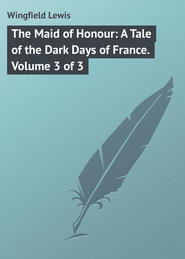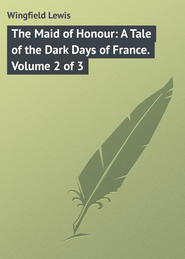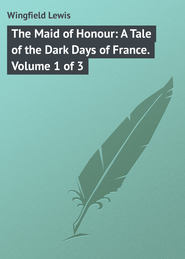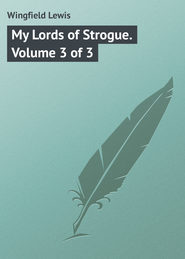По всем вопросам обращайтесь на: info@litportal.ru
(©) 2003-2024.
✖
My Lords of Strogue. Volume 2 of 3
Настройки чтения
Размер шрифта
Высота строк
Поля
To all of these insidious proposals my lady merely opposed a quiet negative, producing budgets from her pocket-voluminous letters from Lord Clare-upon the events which were passing in the capital.
According to him, affairs grew worse and worse, instead of better. The perverseness of his countrymen was appalling to an enlightened mind. There was no knowing what might happen. His dear old friend's second son was behaving ill. Happily, the loyal behaviour of the elder one would be counted as righteousness to the family, by a forgiving and benignant Government.
'It was evident from this,' she declared, with a decision there was no gainsaying, 'that Shane must do as he was doing. Terence might choose to disgrace himself; so Shane's conduct must be all the more immaculate.' (My lady's voice did not falter as she discussed this delicate matter. Doreen merely frowned and turned away.) 'It was the duty of Shane, for the sake of the honour of the Glandores, to keep staunch to the side of Government-the side of law and order-and the best way of doing that was by stopping where he was.'
Shane groaned in spirit, but submitted, and cursed the patriots by all his gods-empty-headed, crack-brained fools-who thus stood betwixt him and pleasure. He pined for Norah, for Cherokee suppers, Blaster orgies. Why, he was almost forgetting what a duel was like! His rapier was rusting on the wall. He became crabbed in his enforced idleness; pinched viciously the satin skins of his pet dogs, instead of stroking them; took more and more to claret; was constantly making trips to Letterkenny.
With the exception of Lord Clare's occasional budgets, the party received little news, save garbled accounts from Letterkenny barracks. My lady insisted upon reading her own letters aloud, for the benefit of her niece; but that young person heeded not the chancellor's prosing, being serenely occupied in following the gyrations of a seamew, or the eccentric movements of a fishing cormorant, so that oft-reiterated abuse of her friends troubled her temper in nowise; and her aunt marvelled how it could be that the froward girl should have become proper and submissive, like well-behaved young ladies.
Is it not singular how to some people we unaccountably and invariably are impelled to show only the ugly or seamy side, which forms part of all our characters, and how to others we, without special effort, always turn the best? My lady and Doreen, though they dwelt together, never really knew each other. At times Doreen considered my lady mad; always harsh and disagreeable; while it was never given to my lady to detect the unselfish devotion and the strong worship of all that is beautiful and free, and the overpowering horror of all that is unjust and base, which was the better phase of her niece's character.
As for the newspapers, nothing could be gleaned from them. So soon as a paper became popular, it was acquired by money or threats (with the exception of Tom Emmett's, which ran its rigs unchecked), and patriotism gave way to padding. There was little Irish intelligence. The Dublin prints might as well have been edited at Sierra Leone; and Doreen turned with impatience from their dulness. She received few letters herself, for there was no one to write to her except the proscribed, and, of course, it would not do for treasonable correspondence to pass through the hands of Lord Glandore, who amused himself by sailing to Rathmelton for the bag. There was no convenient shebeen here, where notes might cunningly be dropped; no useful Biddy or Jug Coyle-not even a handy cabin; for, whilst the peasantry round Dublin were one and all ready to do anything for the cause, those of Ennishowen cared not about it. And she was not sorry for this. With the French fiasco her hopes had melted-she knew too well the discordant elements which composed the Irish Directory. All that had kept its members together had been the expectation of French assistance-now that that was over they would fall asunder, and Cinderella would sit down again amongst the ashes. And was it not indeed better so? The wrath of God was kindled, for some reason which she knew not, against unhappy motherland. Was it not better, then, that her sons should accept their bondage with meekness rather than waste their blood uselessly? Doreen's contentment sprang in the first instance from the nipping of despair. A moment comes to us in our sore trouble, when we fold our arms and murmur, 'By God's mercy there is a limit to the sense of feeling. We have reached that limit, and will feel no more;' and, strange as it may seem, with that resolve comes an impression of calm, which, in its way, is a sort of negative happiness. We have lost something, we are bereft of something which above all things we valued, yet we seem vaguely better for the loss. It is like the expression of peace which all blind faces wear, though their most precious treasure has been stolen-the sense of sight.
Doreen shrank from probing her own feelings with regard to Terence. Certainly his conduct distressed her more than seemed warranted by circumstances. She did not love him. No, not so bad as that, happily. She liked him as a fond sister might like a brother many years her junior, with a good-humoured satisfaction when he did well-for instance, when he made a splendid leap out hunting, or a particularly felicitous shot with his gun; and a feeling of pained displeasure when he did ill. And she told herself that he had behaved very ill, so ill that the fact of his existence must be erased from the tablets of her memory. That he should prove to be so double-dyed a traitor, so despicable and dastardly a schemer, filled her soul with horror.
Being a hero-worshipper, she had always despised him in a kindly superior way, for he was sleek and contented and commonplace, blessed with a good digestion; had looked on his grovelling contentment with pity, and is not pity contempt clothed in tenderness? To have been so interesting Manfred must have had a terrible digestion; while as for the Corsair, I know that in private he suffered from dyspepsia. Whilst taking it for granted that Terence was too easy-going ever to become truly heroic, his cousin had warmed to him on the night at the theatre, when his indignation induced him to take the oath. That all that fervour should have been craftily assumed for the purpose of deceit was too repulsive a subject for reflection, and she put it from her. Maybe if she had calmly brought her mind to bear on it, she might have perceived that she was hasty, and have remembered that it is not right to condemn criminals unheard. But she had caught a glimpse of two ugly facts, and withdrew her gaze from them at once without further inquiry.
Somebody was a traitor. The delegates had been betrayed more than once under the cloak of friendship. My lady had told her distinctly (or in her haste she thought so) that Terence had done the evil deed, for the paltry wage of five hundred pounds. She had deemed that her cousin at least was honest, and before thrusting his image from her sight, had felt, with a soreness for which she could not account, that she would have been very, very glad if she could have pronounced him innocent. Doreen, though she diverted her attention from the painful subject, was wondrously interested-down in her inmost heart-in the guilt or innocence of Terence, and felt a feeble flutter there, whose cause, if she had understood it, would have disgusted her. As it was, the flutter in time died a natural death, and, disillusioned, she sank into the apathetic condition of one who drifts and is content to drift-a rudderless resignation which is beyond despondency-an utter hopelessness with which his behaviour, though she wist it not, may have had something to do.
Not long after her arrival at Glas-aitch-é she received a letter from her father, in which was enclosed another, with whose seal the upright gentleman had refrained from tampering. It was brought to him by an aged crone, who extracted a solemn promise that he would not open it.
'If ye promise,' she said, 'I'll believe ye, Arthur Wolfe, for ye're a good man, or ye would not be given so good a child.'
The eccentricity of the speech pleased the attorney-general, who sent on the letter. It was from his godson Theobald, and Doreen recognised with gratitude the delicate tact which induced her father to pretend that he did not know from whom it came. It removed from her mind the portion of its load which was endured on his behalf; for the young hero was safe. His vessel escaped as by a miracle through the centre of the English fleet. Hoche too was safe. Both were to join the army of the Sambre and Meuse at once. He spoke no more of help from France; was evidently as disappointed as Miss Wolfe was. The dream was over. His sword belonged to the French Republic now, his uniform was that of a French general. He must carve a name for himself among the ranks of the foes of France. Doreen thanked God that his pure young life had not been idly thrown away. Might it be reserved for glorious deeds on behalf of Erin in the future? It was not likely. Better far that he too should have abandoned hope; for Ireland was prostrate, never to rise either in his lifetime or in hers. All they could do was to bear as humbly as they might, shading their eyes from cruel sights-waiting as serenely as was possible for the call to a less hateful world.
So Doreen considered the seabirds and the transparent deeps, and patted little savages on the pate, and smiled her quiet smile, and made believe to be tranquilly resigned; though all the while she was entranced-numbed as by a spell.
CHAPTER VII.
SMITTEN WITH SERPENTS
Doreen was wrong. The French did not abandon so lightly their scheme of striking at Albion through Cinderella. They revictualled their fleet, made good the damage done by winds and waves, and looked forward to the accomplishment of their object within half a year or so of their first failure. To make victory doubly sure, a second fleet was got together in the Texel, under the command of the solid Dutchman, De Winter, who agreed with the Gallic Directory that now was the time or never; for the British navy was utterly disorganised-there were mutinies among the sailors at Plymouth and at Portsmouth, and one more serious still, under Parker, at the Nore. What moment could be better chosen for conveying an army to Ireland than one in which the mistress of the seas lay crippled; when the Channel-unusual circumstance-was open to the world? Wolfe Tone, however, did not recover his enthusiasm. The conduct of his brethren at home, when friendly vessels were in the offing, had been reprehensible-pusillanimous. Instead of rising and making a vigorous effort for freedom, those who pretended to be their chiefs had bickered and shilly-shallied among themselves-a sight to command the scorn of honest men-and the young hero was profoundly discouraged. He began to doubt his countrymen; yet would he not desert them though they seemed inclined to desert themselves, but joined the Texel fleet, under Daendels and De Winter, hoping and praying for the best. It was a fine fleet of fifteen sail of the line and ten frigates. If the wind would only blow fair-if the shoals and sandbanks of the Texel were once safely passed-then success was certain. For Admiral Duncan, who was watching, had but a few vessels under his command, and even some of these were called home in consequence of the Nore troubles.
'Hurry then!' cried De Winter and old Daendels. 'Ship the troops, and let us be off.'
The troops were shipped-everything was ready; but Daendels and De Winter whistled vainly for a fair wind. The elements, as usual, were on the side of England. Before, there had been too much wind; now, not a breath stirred the air. The sea was a dead calm. The admirals and generals marched up and down the deck-beautiful-in blue, with rainbow sashes, and hats prodigious with great plumes of the three colours. But no breeze moved a feather of the plumes. Exasperated, they descended to the cabin to while away the time with music, while the precious sand was dripping in the glass. De Winter had a pretty talent on the flute, as also had Tone, and so these two warriors obliged the company with duets-artistic trills and variations-what a strange spectacle! But by-and-by their patience oozed out of the flute-holes-they cursed themselves, and flung about the music in a passion; and indeed the clerk of the weather was vexing. June was merging into July-the mutinies were being put down-the golden opportunity was slipping visibly away; Lord Bridport cruised out with a fleet to watch the French at Brest; Duncan's handful became a squadron, swinging idly at the Texel's mouth; the soldiers, unaccustomed to close packing, showed signs of sickness; the provisions were sensibly diminishing; unless fortune should choose to turn her wheel with speed this expedition would be a greater fiasco even than the other.
Meanwhile there was a panic amongst the friends of Government in Dublin, who knew not that the elements were fighting for them. The position of England was most critical. Should this new enterprise succeed, what chance of succour could there be from Britain? None. She had quite enough to do to cope with her own difficulties. There were forty thousand soldiers who had been drafted into Ireland by degrees; but could these be relied on? The Hessians were beery brutal wretches, who would probably turn coward at a pinch. The Scotch and English regiments made no secret of their abhorrence of the attitude of the native yeomanry. As for the militia, it was disaffected, and would certainly fling itself into the balance on the side of probable success. The people were fiercely sullen-in a dangerous mood, like rats prepared to spring. If the French should come and be victorious, they would rally like one man round the tricolour, and then woe to the small knot of tyrants! Not one of the ascendency party could hope to escape. Not a Protestant lord or lady in the land but would be hacked in pieces with the inevitably accompanying atrocities of internecine strife. It was an awful prospect. My lords, who had been blindly following the lead of the executive, looked uneasily towards the Castle. They had done as they were bidden, aided by promises and pensions-but of what use is a pension when your throat is cut? Were they to be protected from the growling rabble-these hereditary legislators, who had abused their trust-these amateur colonels who had disgraced their cloth-this venal degraded senate which was a byword among senates? Members of both Houses were nervous. Had their zeal led them perhaps too far? Would it be better to hedge a little-to permit the miserable cottagers to exist in peace? The Privy Council debated long and anxiously. Lord Camden was frightened at the acts which were perpetrated in his name. Mr. Speaker ventured to remark that a line of commendation from Mr. Pitt, and a promise of help in case of need, would be consoling to his coadjutors. Arthur Wolfe became plunged in melancholy. He was drifting on a stream which sickened him, towards a palpable goal which he contemplated with terror. Was there no escape from the horror that was looming? He looked to Lord Clare as to a helmsman who is responsible for the safety of the crew.
But Lord Clare's nerves did not desert him at this crisis. His clear intellect told him that it was too late for hedging; now there was no retreat. King George hated the Catholics, and would smile on those who evilly entreated them. Mr. Pitt had sketched out a plan of action long ago, which must be carried out faithfully to the letter. Mr. Pitt had decided that Cinderella must be put on the rack; that her limbs must be given a good wrenching; and that afterwards-so soon as she should know by experience what agony really is-she should be tucked up cosily and made comfortably bedridden for the rest of her natural existence. It stood to reason that she would scream-so would you or I if thus surgically treated; but when once we grow used to it, there is a charm about being bedridden. People come to amuse us-to feed us with dainty things; they coddle us and comfort us, and we are really not unhappy. Therefore, although these unfortunate mutinies had somewhat complicated the case, it would never do to blench at so critical a moment. Having put his hand to the wheel, my lord chancellor knew that he must look steadily forward, and not backward. His countrymen must be taught that any régime would be better than the one under which they groaned; the senate must be made so to commit itself that it could never raise its head again so long as the world rolled; then what would be easier than to consummate the original plan, to abolish the senate, and absorb Ireland by stratagem into the body of a complete British empire-one and indivisible?
So wrote the chancellor to Mr. Pitt, who replied in courteous language; for his chief puppet was jumping admirably: he would soon be battered and worn out-would then have to be replaced by another. But the doll was not past service yet-it was still gay and bright with paint; was still capable of dancing: so Mr. Pitt wrote civil letters to Lord Clare, bidding him not to stick at trifles. Thus supported, Lord Clare spoke clearly at the Council Board. Desperate diseases must be met with desperate remedies, he said. Arthegal, figure of justice in the Faery Queen, is armed with an iron flail. The people are furious, are they? Then they must be made more furious still. When you want to tame a lion do you pat him? No, or he would rend you. You strike him with whips-touch him with red-hot irons. To be governed he must be ruled by fear; and so is it with the people of this island. Having gone as far as we have, it will never do to show that we're afraid of them. They must be ground down-must be rendered so passive by exhaustion that, French or no French, they will be too weak to do much harm. In the first place we'll arrest those lads again who have been playing the fool too long. We will make a plunge at the leaders, so that if the Gauls should happen to arrive, they will find nobody in authority to co-operate with them.
Lord Camden endorsed these sentiments, mumbling platitudes about self-preservation; that it has unpleasant duties, but that many unpleasant things have to be done, etc., etc., and the council broke up; my Lord Clare strutting forth to give his orders, Arthur Wolfe moving slowly homeward with a worn and troubled face. Then by deft hints and nods and winks, my Lord Clare brought those who served him to know what was expected of them. He rallied the members of the Houses on their nervousness.
'You wear his Majesty's uniform, my lords and gentlemen,' he said. 'I presume you would not wish to be mere carpet-knights. The Irish always were good fighters. You will defend the King's rights if it comes to a brush with the rabble?' He gave the squireens to understand that they were fine jovial fellows, with a strong sense of humour and a subtle appreciation of a practical joke. 'Now that recent invention of yours,' he observed airily, 'of wringing confession from a man by hanging him, then cutting him down before his soul has had time to escape, is vastly droll!'
Thereupon the jolly boys, determined to win yet further commendation, and delighted to give vent unrestrained to the native brutality of uneducated man, set their wits to work and gave birth to other inventions. We know that a demand invariably creates a supply. The gentlemen of the yeomanry vied one with the other in cultivation of their inventive faculty and the result was an array of practical jokes, novel and splendid indeed! Even the great French reign of terror was thrown into the shade. The French, as we all know, are not inventive or witty. A guillotine-a constant flow of blood and falling heads; a boat with a trap-door to drown people by the dozen-amusing rather for a minute, then nauseously dull and monotonous. The jolly Irish boys were much wittier than this, and more ingenious; and yet, by one of the strange chances of history, people shudder still over Robespierre and Marat and their doings, and are absolutely careless and ignorant as to what was done at home not ninety years ago.
Lady Camden grew terrified at reports which reached her ears. Lord Camden shut himself up at the Viceregal Lodge, and promenaded the Phœnix Park, round which was a protecting military cordon. Lords and ladies left Dublin furtively. Some for England-some for their family acres in the far west; impelled-some by fear-some by the promptings of the chancellor-a few only by a sense of duty to their tenantry.
A certain earl set up a triangle in his barrack-yard, and was never weary of flaying the backs of the neighbouring peasants. To such lengths went he and his, that an English colonel, also quartered there, was forced to expostulate with his lordship, to the chagrin of the latter. My Lord Downshire retired to his hills, and kept his regiment within bounds. Indeed, he and my Lord Powerscourt were severely rebuked by the chancellor-the latter especially; for he dared to say that his tenants had been armed at his own expense for the protection of property, not for the commission of murders-upon which the chancellor groaned aloud; for this was a malignant example to others. My Lord Powerscourt, however, was not to be persuaded. He locked up his grand house in Dublin, and revisited it no more until the legislative struggle took place which concluded the century.
Nothing could be more dismal than the Irish capital now. There was a species of curfew at sunset, after which few ventured in the street. Major Sirr and his myrmidons glided hither and thither on their devilish errand of cajoling men to their destruction. It was the business of these miscreants to provide victims for the lash by any means. Bands of drunken yeomanry awoke the midnight echoes with their shouting as they returned from breaking into a dwelling, or from flogging victims in the riding-school. For Claudius Beresford's riding-school had been turned by one of the practical jokes into a torture-chamber, where men, kidnapped on mere suspicion, were dragged and tied up, and lacerated without mercy night and day; whilst scurrying passers-by fled onward with their fingers in their ears. Some died under the lash-some swooned, to wake up idiots afterwards-some recovered, to wear till death livid welts upon their backs and inextinguishable hatred in their hearts.
My Lady Camden, growing more and more apprehensive-for her lord's babble was incoherent-resolved to go down into the city and see for herself what passed there. She drove her four ponies along Ormond Quay, which was as deserted as if the town were plague-stricken; they swerved, and well-nigh upset her ladyship, for a single naked figure came tearing round a corner with wild yells and windmill arms, who, rushing past, flung himself over the parapet into the Liffey. Helter-skelter behind him came the hounds-in scarlet coats and pipe-clayed cross-belts-but the lady-lieutenant saw them not. The agonised victim of a joke wore a pitched cap upon his head, which was set ablaze and was grilling his living brains. This pleasantry was spoiled, for the wretch had presence of mind left to seek oblivion in the water. But another joke succeeded, which bade fair to end badly for the jokers. The Viceroy's lady lay back in a dead faint. Her ponies galloped along the street with her, their reins catching round their legs. The joke might have ended in the breaking of her excellency's precious neck. As soon as possible after this episode, she retired to England, and my Lord Clare made capital out of the circumstance. Were not the people behaving disreputably, when even the wife of the King's representative had thought it necessary to take refuge in flight? There had been, he averred, a new project to storm Kilmainham and set the criminals at liberty. To what a horrid nation was it his destiny to belong!
It is not surprising that at this juncture he should have found an annoying stumbling-block in Curran. That worthy could do nothing but protest; but people who protest can make themselves very disagreeable, especially if they chance to peer further than the mob, and choose to tell what they see. Cassandra was only a mad woman, but we all know how unpleasant she could make herself. Curran had a clear head, a sharp wit, a biting tongue, and he exercised all three in the House of Commons, much to Lord Clare's displeasure. Now we have all learned that as we mount the rungs of the social ladder, society bows more and more before conventionality. Such a thing is 'vulgar'-such another 'low;' why or wherefore nobody can tell, though it probably arises from the fact that the more rarified the atmosphere, the more artificial become those who breathe it, the less liable to think for themselves, the more ready to lean on others' crutches, the more likely to be shocked at the enunciation of new problems, which they are too idle or too prejudiced or too stupid or too sluggish to trouble about sifting for themselves. It might be taken for granted that the senators of both Houses were aware-down in their soul-caves-how base was their line of conduct. But for the sake of their own interest, they had agreed to fence themselves about with a quickset of make-belief, for the concealment of their shame and the protection of their phantom-honour. It was a very vexatious thing, then, for a man who was gifted with an epigrammatic way of crystallising truths to make a snuffy little Solomon Eagle of himself-to persist in uncovering cancers which were decorously sheeted over, to unveil sores which were neatly trimmed about with sham roses.
Lord Clare, in his wrath, resolved to make another attempt to crush the viper. He set a specially rowdy band of jokers at free quarters at the Priory. They rollicked about, frightened Sara out of her wits, drank the lawyer's best whisky; but that vexed him not, for he was incorrigibly hospitable. He locked himself into his bedroom with his child, and droned out, to soothe her, a fantasia on the violoncello. It may possibly have soothed Sara (though she was in awful trepidation lest young Robert should ride up and perceive how she was insulted), but it most certainly succeeded in irritating the jovial sons of Mars in the dining-parlour below. They yelled to Curran to come forth. He came. They took his violoncello and smashed it into bits. Sara quailed lest her father's choler should outstrip his reason; but he only murmured:
'They are actors, playing parts which are set down for them;' and addressing them, said, with scorching contempt: 'Sirs, you are sent here to insult, under his own roof, a man old enough to be your parent, and a young lady whose health is delicate. I sorrow to think that you are Irish, and that the fine cloth you wear should not exclusively be used by gentlemen.' Then, passing through their midst, he saddled his nag, and, trotting into town, related his story to his friend Arthur Wolfe.
The attorney-general was terribly distressed. This stream, on whose bosom he had elected to sail, was taking him-whither? He flew to Ely Place, scolded the chancellor in terms which made the autocrat stare-in such terms of burning reproach that the latter saw he had made a blunder; that he had outstripped prudence, and sulkily signed the order to remove the obnoxious soldiery.
But he was not to be turned from his purpose by any maundering sentimentality on the part of the attorney-general. It was necessary, was it, to leave Mr. Curran alone? That was a pity, but all the more reason for a display of energy in another quarter. In pursuance of his determination, so sweetly expressed in metaphor, to tame the lion with blows and hot irons, Lord Clare proceeded, as chancellor of the University, to hold a visitation there, in order publicly to deplore the doings of the undergraduates.
The worthy gentleman was pained, he said. Alma Mater had taken the fell disease, the contagious epidemic (there could be no doubt about it), the only remedy against the spread of which was cautery. A number of students were ignominiously expelled; foremost amongst them Robert Emmett, (who was conspicuous for a tendency to inconvenient argument,) although his tutor, Mr. Graves, pleaded hard for him. Robert, filled with glee, rushed off to his brother's office to tell the glorious news-that he, boy though he were, had been deemed worthy of the martyr's crown. But when he reached the place he found that there were to be other martyrs besides himself. For the second time the house of his brother Tom was attacked and gutted. As he turned into the street, the presses were being pitched out of window, the types strewn in the mire, the tables and office-stools broken up to make a bonfire. Knitting his brows, he crossed his arms and stood watching the yeomanry at play; then wheeling about, he made the best of his way to Cutpurse Row, where, in the cellar of a crazy tenement, the patriots were accustomed to assemble, instead of riding out to the 'Irish Slave,' as they used more warily to do, before the destruction of the shebeen.
Russell, Bond, Dease, and others were there, delegates of the society for Dublin and its environs. Robert, looking round, perceived Cassidy fidgeting in a corner. Terence was not present. Cassidy observed this, and growled with disappointment between his teeth.
Tom Emmett was finishing a speech, wherein he declared to his audience that his opinions were changed. The French were coming; were, indeed, expected hourly. But it would not do to wait for them, as on a late disastrous occasion; a blow must be struck, a heavy and united blow. If the French came to follow it up, so much the better. The shocking behaviour of the friends of Government was becoming hourly more unbearable; the outrages committed by soldiers at free-quarters daily more flagrant and atrocious. He spoke with Irish hyperbole and a burning fervour of conviction which just suited the temper of his hearers.
'We must heed no more,' he cried, 'the glare of hired soldiery or aristocratic yeomanry. War, and war alone, must occupy every mind and every hand in Ireland, till its oppressed soil be purged of all its enemies. Vengeance, Irishmen! vengeance on your oppressors! Remember the crimes of years! Remember their burnings, their torturings, their legal murders! Remember Orr!'
At the end of a long peroration he paused for breath; and Cassidy, who was evidently anxious to 'catch the speaker's eye,' trolled forth in his rich voice the words which were becoming familiar to every one's lips:
'What rights the brave? The sword!
What frees the slave? The sword!
What cleaves in twain the despot's chain, and makes his gyves and dungeons vain? The sword!
All present took up the chorus, and looked towards the giants as though waiting for the next verse; but he raised his hand for silence, and said:
'Bedad, ye're right, friends. The sword's the only thing for poor Pat. But be careful now. Where's the young lordling who makes himself so busy?'
'Councillor Crosbie should have been here,' returned a delegate. 'Maybe he's bin detained.'
Cassidy smiled a smile of meaning, and leisurely surveying the knot of men before him, replied with a dry cough:
'Maybe he has! Let's hope it's upon honest business. I've come here to give ye a word of warning, a friendly hint I gleaned up at the Castle. I'd advise none of yez to go back to their own homes this day.'
'Why? Speak out, man. We are all friends here,' said Tom Emmett, calmly.
'Becase ye'll chance to find visitors if you do,' was the blunt rejoinder. 'Now I'm off.'
Robert Emmett eagerly corroborated the giant's hint. He had seen the soldiery but now in his brother's house. It was likely that if one was attacked, the dwellings of the rest would likewise receive a visit. It would never do for the prime movers in the conspiracy all to be trapped. Perhaps it was a false alarm, though. At Tom Emmett's a seditious print was published, which it was a wonder had been spared so long. The case of the delegates was different, for strict secrecy had been maintained concerning them. None save the members themselves knew who formed the central committee. Government spies had no means of knowing their names. In this at least they were cautious. That they had all taken the oath, was neither here nor there. If Government intended of a sudden to lay hands upon every Irishman who had taken the oath, they would do well to follow Herod's example at once, and order a general massacre. No, no. It was absolutely impossible that either my Lords Clare or Camden, or Secretary Cooke, could possibly know who all the leading spirits were by whose agency the vast machine of conspiracy was set in motion. Tom Emmett must disappear for a while. His paper put him too much en evidence. It was good of faithful Cassidy to keep his ears open. Blunderer though he was, and lamentable as had more than once been the fruit of his blundering, yet was he now and then most useful, and deserved a special vote of thanks from the Directory, which then and there they passed on him.
Apparently he was modest as well as virtuous, for in the cackle which followed his announcement he departed, his flat face aglow, his eyes twinkling with satisfaction at their compliments.






